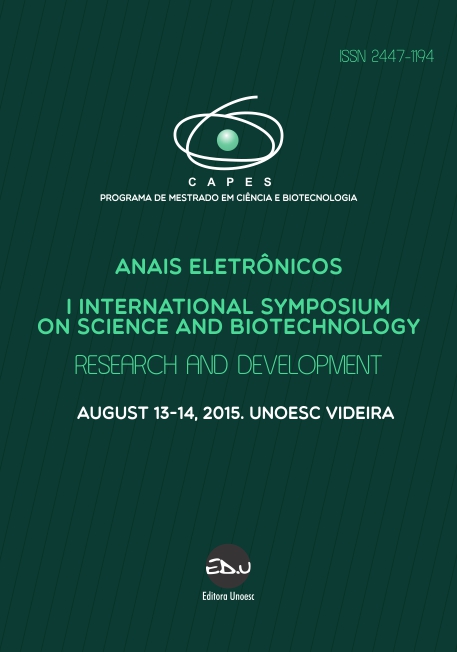UTILIZAÇÃO DE TERMOTERAPIA E DIFERENTES ASSEPSIAS NA INTRODUÇÃO IN VITRO DE PITANGUEIRA (EUGENIA UNIFLORA)
Resumo
Introduction: Native myrtaceans from the Atlantic Forest are valuable genetic and economic resources still characterized and exploited in an incipient way. Due to this reason, this work aimed in vitro introduction of Eugenia uniflora (Surinam cherry) from seedlings submitted to thermotherapy and different asepsis, for subsequent studies in micropropagation. Methodology: Surinam cherry seedlings (1.5 year) were submitted to thermotherapy, remaining in sequence for: 33±0.5ºC (two days); 35±0.5ºC (three days); 38±0.5ºC (ten days). Next, green shoots were sectioned and formed explants with 08-12 milimeters. Six different aseptic treatments were tested. These treatments initiated with an immersion in ethanol 70%v/v (50 seconds), differed by immersion time in NaClO 1.5% of active ingredient (control; 0; 5; 10; 15; and 20 minutes) and culminated with three washes in sterile distilled water. A “Murashige-Skoog” medium was used with half of the salts and increased benzylaminopurine (MS/2 + 0.2 mg.L-1 of BAP). Each treatment consisted of seven repetitions of 4 explants. The percentages of bacterial and fungal contaminations, of oxidation and survival of explants were evaluated at the 30th day of in vitro introduction. Variance analysis and Tukey test (p<0,05) were utilized. Results: After thermotherapy, were obtained large amount of green shoots, etiolated and without thermal damage, proving to be a great technique for the production of Surinam cherry explants for micropropagation. After thirty days in vitro, the asepsis in NaClO solution (10 minutes) showed the highest survival percentage (89.29%) and a lowest oxidation (21.43%). With this treatment, low percentages of fungal and bacterial contamination also were obtained (25.00% and 3.57%, respectively). Conclusions: The thermotherapy of seedlings associated with asepsis in ethanol 70%v/v and NaClO solution 1.5% of active ingredient (10 minutes) enables the Surinam cherry’s in vitro introduction with high survival, low oxidation and reduced bacterial and fungal contamination, allowing the micropropagation of this species.
Keywords: Atlantic Forest. Native myrtaceans. Micropropagation. Pitanga. Benzylaminopurine.


